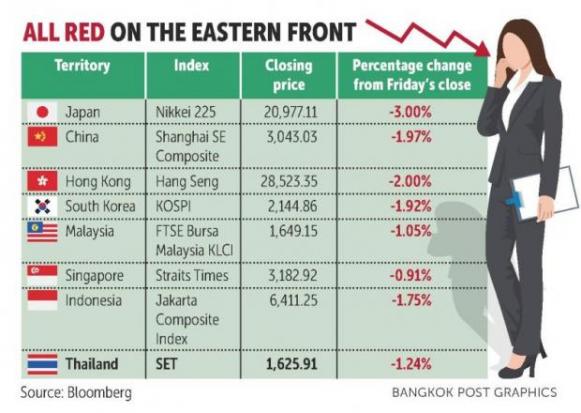Thailand: Baht strengthens despite SET index dip
The Stock Exchange of Thailand (SET) index on Monday fell over concerns of a political gridlock following Sunday’s general election, but the baht’s value strengthened as investors offloaded their US dollar holdings.
Thailand’s benchmark index closed at 1,625.91 points, down 20.38 points or 1.24%, in turnover worth 47 billion baht.
A dip in Thailand’s stock market followed a broader equity sell-off seen across Asia, with Japan’s Nikkei 225 index dropping the most by 3%.
Late on Monday afternoon, the Election Commission (EC) announced so far Pheu Thai Party’s unofficial tally of constituency seats stood at 137, compared with the Palang Pracharath Party’s (PPRP) 97.
Pheu Thai needs help from other parties to garner the 251 votes for the right to nominate the prime minister — who is then subject to a vote from the 500 MPs together with the 250 senators.
EC secretary-general Ittiporn Boonprakong said official results from at least 95% of the House of Representatives’ seats will not be finalised until May 9.
Pattera Dilokrungthirapop, chairwoman of the Association of Securities Companies, said the Thai stock market dropped on Monday because of a previous plunge in the Dow Jones index following steep differences between China and the US ahead of another round of bilateral trade talks.
Although the general election is over, attention is fixed on which party, Pheu Thai or PPRP, will be successful in setting up a new government, said Mrs Pattera.
A close race between the two political parties mean market participants are concerned about government stability in the future, she said.
“The global stock markets plunged on Monday after the Sino-US trade negotiations saw no progress,” said Paiboon Nalinthrangkurn, chairman of the Federation of Thai Capital Market Organizations.
Both PPRP and Pheu Thai have an opportunity as leading parties to form a coalition government, while future government stability will help attract foreign inflows expected to be worth around 100 billion baht, said Mr Paiboon.
No matter which party manages to form a government, Thailand’s GDP growth is not projected to expand significantly as the economy still relies on exports and tourism, with government spending and private consumption still making up minor proportions, he said.
FIRMER BAHT
Despite a sell-off in the SET index, an opposite direction was seen for the baht as the local currency’s value strengthened against the greenback.
The baht is the best performing currency in Asia, gaining around 3% year-to-date. It rose to 31.63 against the dollar as of Monday’s press time from 31.68 logged on Friday.
The US Federal Reserve’s dovish comment that it was unlikely to lift interest rates this year contributed to the firmer baht, said Jitipol Puksamatanan, chief markets strategist of the global markets group at Krungthai Bank.
But the baht’s value is likely to reverse in the upcoming period as heightening political uncertainties in forming a new government should pressure the local currency, said Mr Jitipol. Such movement should be short-lived once a new government is formed after the electoral process, he said.
Ariya Tiranaprakij, senior executive vice-president of the Thai Bond Market Association (TBMA), said the yield gap between short-term and long-term US Treasury bonds was negative on Friday following the Fed’s signal it would maintain interest rates, prompting the market to shift from high-risk assets to safe-haven counterparts amid concerns that an inverted yield curve is a sign of a recession.
Non-resident flows in the Thai bond market were registered at 162 million baht on Monday, according to TBMA data.
Returns on government short-term and long-term bonds remain positive, but returns have dipped slightly by around 1-4 basis points, said Ms Ariya.
Source: https://www.bangkokpost.com/business/finance/1651068/baht-strengthens-despite-set-index-dip


 English
English




